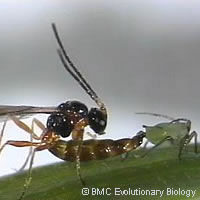Bad housekeeping good for aphids, study shows
Researchers in Belgium and Canada have determined that aphids can improve their chances of survival by playing a confidence trick on wasps. Female Aphidiinae wasps lay their eggs inside aphids, and when the larvae grow the aphids die. A study published in the journal BMC Evolutionary Biology demonstrates that by leaving their old shells, called exuviae, lying around like so many teenagers' socks, these tiny creatures trick parasitoid wasps into wasting time on decoys. According to the study's lead investigator, Dr Frédéric Muratori of the Catholic University of Louvain in Belgium, scientists have long been puzzled by the 'bad housekeeping' of aphids. 'By leaving exuviae around the colony, aphids make detection easier for the parasite wasps. As such, this behaviour has been thought counter-selective,' he said. Insects go to great lengths to remain undetected by hiding their chemical signatures (kairomones) from predators. As aphids use their hind legs to kick their excretions away from the site of their colony, one would expect that they would also try to keep their kairomone-covered moulted shells as far away as possible. But they don't, for good reason. The researchers observed the behaviour of aphids and parasitoid wasps in a laboratory environment, and analysed their activities using event-recording software (a digital camera connected to a computer). They found that an exoskeleton-littered aphid colony tricks wasps into wasting time investigating old shells, effectively limiting the damage done to the aphid population. 'We found that [female wasps] spent more time in patches that contained exuviae than in patches that contained only aphids, suggesting that these females either did not recognise exuviae as low-quality hosts or needed time to correctly identify them,' explained Dr Muratori. The wasps attacked the aphids' old shells at the same rate that they attacked the real bugs, and didn't seem to catch on that the shells weren't the real thing. While the wasp is busy examining the decoys, the aphids gain a few precious moments to make their escape. This is thanks to the 'witness' aphids that spot the invader: they release an alarm pheromone that alerts other aphids to the threat, so they can flee.
Countries
Belgium, Canada



